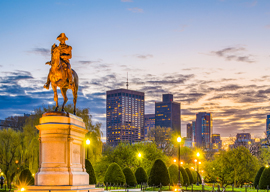
August 23, 2017

Boston, Massachusetts
Source: Bigstock
Francis Fukuyama hypothesized the ending of history, but he failed to foresee the increasingly popular practice of the mending of history to delegitimize the right of the politically weak to their pride and property.
Rewriting the past to help disinherit the powerless by demeaning their ancestors is an ancient practice currently growing in popularity. For example, this summer in Madison and Boston, government officials have obliterated or covered up grave markers commemorating prisoners of war who died in captivity.
This is justified as punching up against white supremacy. After all, who is more powerful than a dead POW?
Why are politicians today going out of their way to disrespect Confederate soldiers who died in Union prison camps more than 150 years ago? Because they can. Because this kind of vandalism is a classic turf-marking exercise understood by even the dimmest juvenile delinquents. Because desecration of memorials to the dead signifies that their living heirs are vulnerable to rapacity.
Further, this ISIS-like destruction of monuments can provoke individual losers in this struggle to overreact, which in turn is instantly used to justify more despoliation.
As a Hegelian, Fukuyama defined history as the struggle among ideologies, such as communism and fascism. He became famous for arguing that by 1989, history was over: Capitalist representative government had defeated its left and right rivals and nothing would ever change.
In reality, of course, what everybody who isn’t Fukuyama thinks of as history—the process that creates winners and losers—has been happening since Nineveh and Tyre, long before modernist ideologies ever emerged. Similarly, under whatever nominal rules of the game happen to be prevailing in the future, winners and losers will continue to be crowned after Fukuyama is forgotten. The game of power and property goes on forever.
A central political question since civilization began has been the inheritance of property.
Most societies that have ever accomplished much have treated property with respect. Property rights, both private and public, incentivize innovation and promote conservation by avoiding the tragedy of the commons.
The liberal political philosopher John Rawls explained:
Unless a definite agent is given responsibility for maintaining an asset and bears the responsibility and loss for not doing so, that asset tends to deteriorate. On my account the role of the institution of property is to prevent this deterioration from occurring.
History suggests that property works best when it exists in multiple forms, such as personal, corporate, and public.
Various ideologues on the left and right have tried to abolish one form or another of property. Marxists attempted to eliminate large-scale accumulations of private property, but communist states soon succumbed to economic stagnation and environmental degradation.
British socialists attempted to split the difference by allowing the accumulation of private property during one’s life, but expropriating it through ruinous death duties upon one’s death. But this led to a shoddy society. As Rawls observed:
The perpetuity condition is crucial.
Today, libertarian extremists of the Cato Institute ilk have been attempting to eliminate the concept of national property, the shared patrimony of Americans, by demanding open borders. But Rawls, despite his famous “veil of ignorance” liberalism, realized that permitting massive immigration would be disastrous:
…an important role of government, however arbitrary a society’s boundaries may appear from a historical point of view, is to be the effective agent of a people as they take responsibility for their territory and the size of their population, as well as for maintaining the land’s environmental integrity.
The preservation of national borders is crucial for preserving the well-being of self-regulating peoples by keeping out invading overpopulators:
People must recognize that they cannot make up for failing to regulate their numbers or to care for their land by conquest in war, or by migrating into another people’s territory without their consent.
While Marxism was nominally anti-nationalist, it most succeeded politically—such as in China, Vietnam, and Cuba, where Communist Parties still reign—by mobilizing nativism. Ironically, Marxists proved some of the most successful nationalists of the 20th century. Mao, Ho, and Castro were failures as economic leaders, but their political heirs remain in power because the founding tyrants drove out the foreign devils.
On the other hand, a lot of money can be made by importing foreigners, as Mark Zuckerberg’s vastly well-funded campaign for more immigration to drive down coder salaries has demonstrated.
Winners are successful at portraying themselves as deserving their property. The Bible, for example, goes to great lengths to honor Abraham. The reverence paid to him is seen as justifying his distant heirs’ possession of the Holy Land. Conversely, the wickedness of the Canaanites, as recounted in their enemy’s book, explains why they didn’t get to keep their possessions.